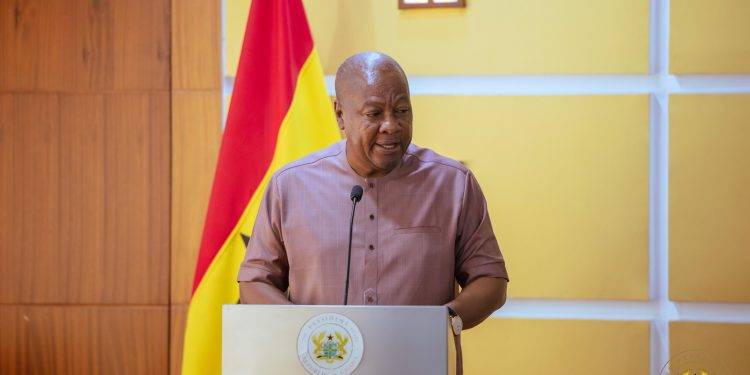The first time I touched a “Made-in-Ghana” tee-shirt that actually felt soft—like ‘I-could-sleep-in-this’ soft—I was standing in a musty booth at a Las Vegas trade fair, 2016.
A buyer from Brooklyn had just scribbled an order for 12,000 pieces, and the AshantiTex rep beside me was vibrating with quiet ‘we-made-it’ energy.
That memory flashed back the instant I read John Mahama’s line: “AGOA is technically dead.”
Technically.
Dead.
Two small words that land like a crate of rotten mangoes on the dock.
I blinked, scrolled, blinked again.
Wait—wasn’t AGOA the lifeline we bragged about at every diaspora dinner?
The US law that let African garments slip into American malls duty-free, while Chinese containers still paid gate fees?
Yep.
And now, according to the former president, Trump’s blanket tariffs have basically switched off the oxygen.
No drama, no press-conference eulogy, just… click.
Off.
Funny thing is, I’d spoken to a seamstress in Adabraka only last week.
Mama Ama.
Forty-seven years old, six grandchildren, two ancient Singer pedals she refuses to retire.
She told me her biggest client—an “ethical boutique” in Ohio—emailed to say they’re “re-evaluating supply chains.”
Translation: we’re scared of Trump’s Twitter fingers.
So her weekly order of 800 skirts shrank to 200, then 50, then “we’ll revert.”
Revert.
Corporate speak for “go eat air.”
You feel that?
That tiny hiccup between hope and rent day?
Multiply it by a thousand small factories from Tema to Takoradi, and suddenly Mahama’s blunt verdict feels less like campaign rhetoric, more like a weather report: cloudy with widespread joblessness.
But let’s not pretend AGOA was some fairy godmother waving a wand of everlasting visas.
Nah.
It had cracks before Trump stomped in.
I saw it myself in 2019—shipping agents who demanded “handling” that could fund a small wedding; banks that treated a letter of credit like a ransom note; and Ghanaian designers who still believed “packaging” meant stuffing dresses into rice sacks.
We wasted time, and time, as my grandma loved to say, does not eat kenkey—it eats you.
Still, the numbers were sexy while they lasted.
$270 million worth of non-oil exports from Ghana to the US in 2022; 70 % of that rode the AGOA wave.
Take away the duty-free cushion, and our T-shirts suddenly cost eight cents more than Vietnam’s.
Eight cents!
In fast fashion that’s the difference between “Add to Cart” and “Next!”
Brutal.
I can almost hear the government spokesperson now: “We are exploring alternative markets—Japan, UAE, the moon…”
Fine.
But new markets don’t magic up overnight; they demand samples, certifications, middle-men who reply to emails without asking for *“something small.”
Meanwhile, Mama Ama’s girls still show up at 6 a.m., scissors dangling like question marks from their necks.
You tell them “explore alternative markets” and they’ll ask if those markets can pay trotro fare next Monday.
And, weirdly, I get Trump too.
(Stay with me.)
The man wakes up, smells a trade deficit, and hits “tariff” like it’s a snooze button.
He isn’t targeting Ghana; we’re collateral shavings off a bigger woodwork.
But pain feels personal when your sewing machine falls silent, right?
So where does that leave us—apart from staring at an empty shipping container wondering if we could turn it into a pop-up church?
Mahama hints at a “continental strategy,” West African factories ganging up to bargain better terms.
Nice idea.
ECOWAS meetings, however, run on African time—plus two extra hours for opening prayers and group photos.
By the time we agree on a comma, Trump could be reinstated, indicted, reinstated again, and selling NFTs of his mugshot.
Maybe the fix is smaller.
Maybe Mama Ama joins an online webinar on “How to sell directly to US consumers via Etsy,” learns to photograph skirts on a sunny veranda, tags them “slow fashion, stitched with Adinkra love,” and ships through DHL’s small-parcel promo.
Would that replace 20,000-piece orders?
No.
But it pays tomorrow’s light bill, and keeps pride alive—one five-star review at a time.
And government?
Oh, they could speed-boat in: zero import duty on fabric, a one-window export office that actually opens, a tech voucher that pays for Shopify subscriptions instead of another “study tour” to Paris.
Dream big, they say; I say dream specific.
Look, I’m no economist—just a guy who once folded tees in Vegas and saw what possibility smells like (hint: cotton, jet fuel, and a whiff of Starbucks).
AGOA might be “technically dead,” but technical deaths can be reversed; ask any IT guy who’s resurrected a “bricked” phone with the right firmware.
Question is, do we have the cable?
The patience?
The humility to admit we can’t business-as-usual our way out?
I don’t know.
Seriously—I’m typing this on a laptop whose “G” key keeps popping off, and I’m wondering if that’s an omen.
But I do know tomorrow morning Mama Ama will oil her sewing machine, because thread is still cheaper than therapy.
She’ll stitch, hum, and hope.
And somewhere between the hum and the hope, Ghana will decide: learn to sell without AGOA, or fold our hands and wait for the next American president to love us again.
So here’s my light, slightly dented opinion: stop begging for duty-free miracles; start building brands Americans will pay extra for—even if it costs them eight cents and a story.
Because in the end, people don’t just buy clothes; they buy the feeling they get when they read the label and think, “Wow, a real human made this.”
Let’s make sure that human is still smiling.
Deal?


